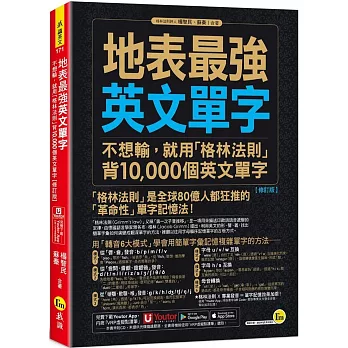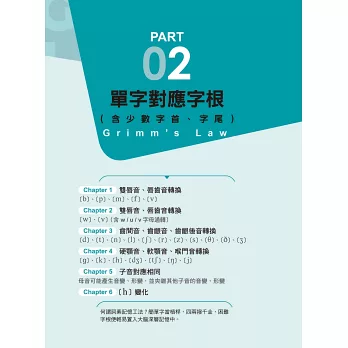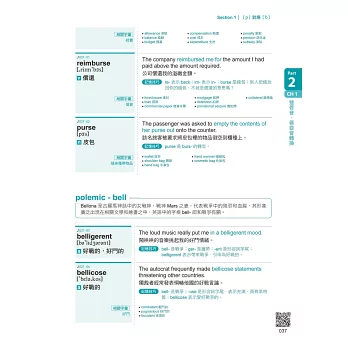根據統計,
67%的上班族認為:英文是提升職場競爭力最直接的方法!
他們同時認為,
學習英文的第一步,
就是先從擴充單字量下手!
但是,
「單字背不起來」、「總是背了又忘」
卻是他們共同的困擾!
《地表最強英文單字:不想輸,就用「格林法則」背10,000個英文單字》
教你用「格林法則」,
了解「字首、字根、字尾」的轉音與演變!
以腦海中現有的單字,
搭配「格林法則」及「字首、字根、字尾」記憶法,
瞬間擴充你的單字庫,
讓你背7,000、10,000、甚至100,000個英文單字!
■ 「格林法則」是全球74億人都狂推的「革命性」單字記憶法!
「格林法則(Grimm’s law)」又稱「第一次子音推移」,是一項用來描述印歐語語音遞變的定律,由德國語言學家雅各布.格林(Jakob Grimm)提出。利用英文的形、聲、義,找出簡單字彙如何演變成艱深單字的方法,推翻以往用字母順序記憶單字的古板方式。
■ 用「轉音6大模式」學會用簡單字彙記憶複雜單字的方法!
● 模式01──從「唇、齒」發音
如p與f都是用唇發音,「pisc-」等於「fish」,皆表示「魚」。從「fish」聯想,進而學會「Pisces」這個單字,是否簡單許多?
● 模式02──從「齒間、齒齦、齒齦後」發音
如t與d是用這種發音模式,唸唸看「two」和「du-」,發音是不是非常相似?兩者皆是「二」的意思,用這項規則,便可記得「dual(雙重的)」、「duet(二重唱)」等單字。
● 模式03──從「硬顎、軟顎、喉」發音
如「horn(角)」透過發音「g / k / h」可以互換規則,進而記憶單字「unicorn(獨角獸)」;uni-表示「單一」,「corn」由「horn」演化而來,都表示「角」。
● 模式04──字母u / v / w互換
「wine(酒)」由拉丁文的「vin-(酒)」透過「v / w」互換演化而來,進而記憶「vinegar(醋)」。酒發酵後會產生酸味,形成「醋」。
● 模式05──字母h / s互換
「hyper-」等於「super-」,意思皆為「超過」,透過「h / s」能互換的規則,可以一起記。
● 模式06──母音轉換
「sit(坐)」→「sat」、「get(拿、取)」→「got」,這些單字的過去式,都是母音轉換、子音相同對應的規則演變而來。
■ 為什麼要用「格林法則」記憶單字?
● 考據字源史料,真實呈現格林法則。
書中2,000個「字源」的演變歷史皆考據史料,並非東拼西湊而來。學習者能透過了解「字源」的演化,進而加深對每一個字彙的印象。
● 重要轉音例字,解碼單字字根關聯。
由作者彙整相關字源衍生的重要單字。從字源記憶字根,是記憶單字的絕佳方法。書中單字適用於學測、指考、多益(TOEIC)、托福(TOELF)、雅思(IELTS)等英文檢定考試。
● 拆解單字,掌握單字技藝學習要領。
每一個字根皆搭配相對應的單字拆解記憶法,透過「格林法則」學習字首、字根、字尾的單字記憶規則,雙管齊下,提升學習效益。
● 相關字彙同時記憶,提升單字量。
如何短時間提升腦海中的單字量?透過單字的串聯記憶法,記憶字根的同時,也一併學習其他的相關字彙,單字量瞬間倍增。
● 實用例句搭配慣用語,拓展學習視野。
學習單字除了要搭配實用例句外,例句中的搭配詞和慣用語也是學習的重點之一。本書詳細統整了每個單字的例句、搭配詞和慣用語,讓學習者拓展學習視野。
【使用說明】
Step 1. 了解「格林法則」的語音及釋義規則,單字好記憶!
每一組套用「格林法則」的單字,會先說明對應的語音及釋義規則,幫助學習者們理解及記憶!
→ purse – burs:purse本指皮革製的囊袋,其語音上對應到的字根burs也有相同概念,所以便可衍生出bursa、bursar、reimburse等字根相同的單字組合。
Step 2. 單字記憶技巧 X 相關字彙補充 = 一次記憶多組單字!
每個單字除了補充中文意思、KK音標、詞性及例句外,也補充記憶技巧及相關字彙,讓你一次不只記一個單字!
→ reimburse的記憶技巧:re-表示back(回);im-表示in-(進);burse是錢包。別人把錢放回錢包,就是「償還」的意思。
Step 3. 附錄依照A-Z排序的單字索引,查找複習單字好方便!
本書依照「格林法則」將單字分類,若有想查找的單字,卻又忘記該單字適用於哪種規則,便可利用附錄的索引,搜尋開頭字母就能知道單字所在的頁數!
→ 忘記reimburse適用purse – burs的規則沒關係,翻到附錄R的部分,就能找到單字及其所在的頁數。
Step 4. 用「Youtor App」聽單字發音音檔,多聽就能加深印象!
手機下載「Youtor App」(內含VRP虛擬點讀筆)掃描QR Code,即可聽取由美籍老師及中文老師親自錄音的中英單字發音音檔,多聽就能加深所有單字組合的印象,將單字放進大腦中的長期記憶區!
★使用Youtor App,掃描頁碼旁QR Code就能下載及聆聽音檔。
★本書未提供CD,也未提供燒錄光碟服務。
[VRP虛擬點讀筆介紹]
1. 在哪裡下載「VRP虛擬點讀筆」?
(1)讀者可以掃描書中的QR Code連結,或是於App商城搜尋「Youtor」下載即可。
2. 為什麼會有「VRP虛擬點讀筆」?
(1)以往讀者購買語言學習工具書時,為了要聽隨書附贈的音檔,總是要拿出已經很少在用的CD播放器或利用電腦,又或是轉存到手機來使用,耗時又不方便。
(2)坊間當然也有推出「點讀筆」來改善此種學習上的不方便,但是一支筆加一本書往往就要二、三千元,且各家點讀筆又不相容,CP值真的很低。
(3)後來雖然有了利用QR Code掃描下載檔案至手機來聽取音檔的方式,但手機不僅必須要一直處在上網的狀態,且從掃描到聽取音檔的時間往往要花個5秒以上,很令人氣結。
(4)因此,我們為了同時解決讀者以上三種困擾,特別領先全球開發了「VRP虛擬點讀筆」,並獲得專利,希望這個輔助學習的工具,能讓讀者不僅不用再額外花錢,且使用率和相容性也是史上最高。
3. 「VRP虛擬點讀筆」就是這麼方便!
(1)讀者只要透過書中的QR Code連結,就能立即下載「Youtor App」。(僅限iPhone和Android二種系統手機)
(2)下載完成後,可至App目錄中搜尋需要的音檔或直接掃描內頁QR Code,將音檔一次從雲端下載至手機使用。
(3)當音檔已完成下載後,讀者只要拿出手機並開啟「Youtor App」(內含VRP虛擬點讀筆),就能隨時掃描書中頁面的QR Code立即讀取音檔(平均1秒內)且不需要開啟上網功能。
(4)「VRP虛擬點讀筆」就像是點讀筆一樣好用,還可以調整播放速度(0.8-1.2倍速),加強聽力練習。
(5)「VRP虛擬點讀筆」比點讀筆更好用,具有定時播放、背景播放的功能,也可以自動換頁或是手動點選想要的頁數,聆聽該頁音檔。
(6)如果讀者擔心音檔下載後太佔手機空間,也可以隨時刪除音檔,下次需要使用時再下載。購買本公司書籍的讀者等於有一個雲端的CD櫃可隨時使用。
(7)詳細使用及操作方法請見書中使用說明。
※本書未提供光碟燒錄服務。
※雖然我們努力做到完美,但也有可能因為手機的系統版本和「Youtor App」不相容導致無法安裝,在此必須和讀者說聲抱歉,若無法正常使用,請與本公司聯繫,由專人為您服務。



 天天爆殺
天天爆殺  今日66折
今日66折 












































 博客來
博客來 博客來
博客來 博客來
博客來 博客來
博客來 博客來
博客來